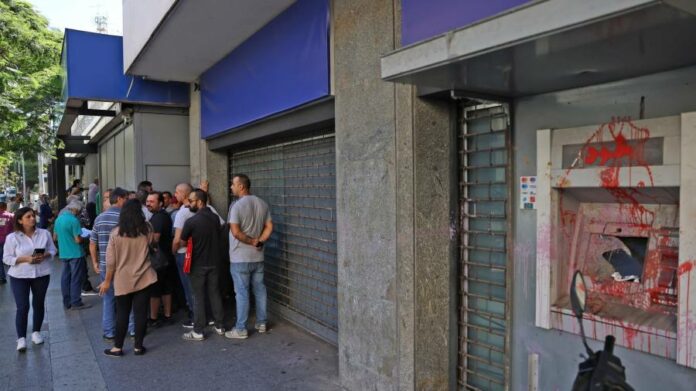Lebanon’s commercial lenders have closed their doors to customers for an open-ended strike that presents the latest obstacle for beleaguered depositors struggling to withdraw their money from the country’s zombie banking system.
The closure of the banks from Tuesday, for an indefinite period, is largely in response to what the industry said were “arbitrary” judicial decisions against them, which had drained their already dwindling foreign currency reserves.
The banks also complain that borrowers are allowed to repay their foreign currency loans at the old exchange rate from before last month’s official devaluation, while the lenders were still required to meet their obligations in foreign currencies.
The Lebanese pound has plummeted more than 98 per cent against the US dollar since the country went into economic meltdown in 2019 after decades of state-sponsored corruption and financial mismanagement by successive governments.
Lebanon’s banks have been at the forefront of the financial crisis. In the absence of formal capital controls, banks restricted foreign currency account holders’ withdrawals to limited sums in Lebanese pounds at an exchange rate far lower than the street value used for most transactions.
Some depositors — in Lebanon and abroad — responded by suing banks to pressure them into releasing their trapped savings. Some even resorted to holding up their lenders at gunpoint in an effort to release their own funds.
As a result, Lebanese banks are mostly limited to distributing account holders’ paltry monthly allowances and salaries at the end of each month, leading them to be labelled “zombie banks”.
Lebanon’s banks have blocked attempts to blame their shareholders for the crisis, as outlined in an economic recovery plan agreed with the IMF, insisting that the government and individual depositors should carry the largest burden for the estimated $72bn financial hole.
The Association of Banks in Lebanon, which represents the industry, has pleaded with the government to “shoulder their responsibilities” for the country’s mounting woes and find a “comprehensive solution to a systemic crisis”.
“Arbitrary judicial decisions . . . reduce the chances for depositors to recover their deposits in foreign currencies — and even eliminate them,” the ABL said in a statement. It also complained about money-laundering charges levied against two of its lenders.
Banks closed their doors to customers before to protest a Lebanese court ruling that forced Fransabank, one of the country’s largest, to pay out two of its depositors’ trapped savings in cash. They agreed to suspend the strike a week later at the request of caretaker prime minister Najib Mikati. They also went on strike following the armed confrontations.
The Lebanese pound this week fell to a record low of 96,000 to the US dollar on the parallel market that dominates most transactions. The official exchange rate is 15,000 Lebanese pounds to the dollar following last month’s devaluation, although different exchange rates govern telecommunications, public sector salaries and fuel prices, among others.
Lebanon’s economic crisis has pushed three-quarters of its population of 6mn below the poverty line. The government reached a draft agreement with the IMF almost a year ago but the deal to unlock a $3bn loan facility was contingent upon economic and political reforms, including a restructuring of the banking sector.
However, sluggish progress on these has led many in Lebanon to fear that the IMF agreement will not be finalised.






